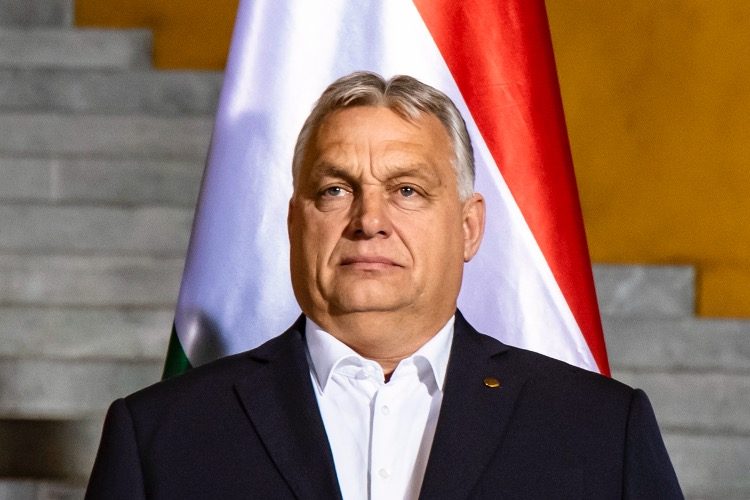
Hungary’s ruling Fidesz party is set to unveil a bill to the nation’s parliament that will set up a special office to keep track of activities that “threaten the sovereignty of the country.”
The new department would supervise the inflow of foreign funding to political parties, media, and public organizations believed to be singled out for manipulation by adversaries or financial interests, such as Hungarian-American leftist billionaire George Soros.
Gergely Gulyas, the chief of staff for Prime Minister Viktor Orbán, stated that it “could probe all sorts of activities … that would violate the sovereignty of the country.”
When plans to create the new authority were released to the public in September, a Fidesz party member suggested the measure could apply to “left-wing journalists, quasi-civil organizations,” and political parties.
Recently, Orbán lamented at a party meeting that foreign actors were manipulating the various strata of Hungarian society via civil society groups and media “financed by Brussels or through the Soros network.”
“They have openly said that they want a change of government in Hungary,” he said in a speech earlier this year, decrying his enemies for using “every means of political corruption to finance the Hungarian opposition.”
Orbán and other Fidesz lawmakers have specifically slammed the EU for meddling in the country’s political process by withholding 28 billion euros ($30 billion) in funds until it meets a long list of 27 judicial, media, and economic reforms dictated by Brussels. Although the latter has long slammed Hungary for not meeting EU standards about the rule of law, Budapest has contended that such allegations are politically motivated.
In 2017, Hungary passed legislation addressing NGOs receiving foreign funding, a law decried by the EU Court of Justice for supposedly introducing “discriminatory and unjustified restrictions” on fundamental rights.
Naysayers, such as the Hungarian Civil Liberties Union, have similarly posited that the present legislation hopes to “limit participation in public life and the operation of the free press.” Pointing out that political parties are already forbidden from obtaining foreign funding, the group’s strategy director Stefania Kapronczay told The Guardian that the new legislation is likely to reiterate the government’s narrative that any foreign funding would undermine Budapest’s interests.
On October 23, Hungarian Foreign Minister Péter Szijjártó rebuffed claims that Hungary had supplied Russia with “sensitive” information about EU affairs, saying Hungary is a sovereign nation whose government does not take foreign dictates.
The minister was responding to questions fielded by reporters on the fringes of the EU foreign ministers meeting in Luxembourg, and was asked about European views regarding Orbán’s meeting with Russian President Vladimir Putin. Both leaders held discussions in October at a meeting for the Belt and Road Initiative in Beijing. This meeting was the first in-person talk that Putin has had with a European leader since meeting with Austrian Chancellor Karl Nehammer in April 2022. During the meeting, Orbán highlighted the importance of maintaining economic relations with Russia, especially in energy-related matters, as Hungary is reliant on Russian energy supplies.
Furthermore, Hungary as an EU and NATO member has been lobbying for a mutually agreed settlement between Russia and Ukraine in the pursuit of peace, against the wishes of Washington and Brussels. Orbán emphasized that “Hungary has never wanted to stand against Russia.”
Orbán’s remarks incited the criticism of U.S. ambassador to Hungary David Pressman, renowned for his vocal anti-Fidesz stance. Pressman denounced the Hungarian leader for emphasizing business links over Ukraine’s situation.
Later, Orbán’s political director Balázs Orbán blasted Pressman, slamming the diplomat for hypocrisy, quoting America’s increased dependence on Russian nuclear fuel as a counterpoint to Pressman’s criticism of the Hungarian government.
Appointed to the role by U.S. PresidentJoe Biden in 2022, Pressman has been known for his intense interference in Hungarian affairs. The United States imposed visa sanctions on Hungary in August, primarily owing to Budapest’s stance on the Russia-Ukraine conflict.
Also, Orbán’s handshake with Putin drew flak from many European capitals, with one remark insinuating that Orbán had met “a war criminal.” Another comment by Lithuanian Foreign Minister Gabrielius Landsbergis targeted Szijjártó, telling him to make it clear each time he speaks if he was giving his own opinion or the Kremlin’s. In response, Szijjártó told reporters, “I reassured my Lithuanian colleague that Hungary is a sovereign country with a sovereign government, and while this government is in office, we will not accept any foreign guidance or dictates.”
Likewise, left-wing news outlet Politico wrote, “There’s a deeper fear over Hungary: the country will hold the Council presidency next year and there are concerns that it could share sensitive EU information with Moscow.”
Politico also cited a “senior EU diplomat” saying, “there’s not much we can do about it.”
In response, Szijjártó said such remarks were “stupidity,” adding that “some people may use such meetings to divulge information, others may report to Politico right after a foreign affairs council meeting, but not us.”
Moreover, Hungarian government spokesman Zoltán Kovács told The European Conservative, “The European Left tries everything to tarnish Hungary. There is only one prime minister in the EU today under whose leadership a rotating presidency has been conducted: Viktor Orbán. In 2011, during similarly ‘troubled’ political circumstances, Hungary gained everyone’s respect after it successfully and safely completed its Council Presidency. We are prepared to do the same again.”
Regarding Hungary’s stance on importing Russian gas, Szijjártó said energy was not a political matter, but a question of security. “We are not willing to risk the security of Hungary’s energy supplies. Hungarians are not responsible for the war in Ukraine, they should not have to pay the price,” he continued.
Recently, Russia’s Gazprom CEO Alexei Miller said that the state-owned multinational energy corporation will supply extra gas to Hungary in the coming winter, adding that 1.3 billion cubic meters of gas have already been delivered to Hungary besides existing contracts this year. Responding to EU’s unhappiness about the deal, Szijjártó maintained that there are no EU sanctions regarding the import of Russian gas: “Everyone can buy gas from wherever they want.”
Hungary is poised to hold the rotating presidency of the European Council in the second half of next year, and the left-liberal majority of the European Parliament authorized a resolution in June urging the European Commission and the EU Council to employ their powers to prevent Hungary from taking the role.


